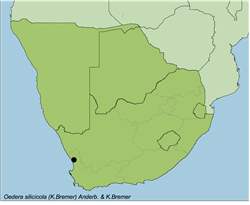Names and synonyms
Oedera silicicola (Bremer) Anderberg & Bremer
=Relhania silicicola Bremer
Type
Ihlenfeldt 1090, Koekenaap, 1961 (NBG, PRE).
Derivation of names
Oedera = after George Christian Oeder (1728-1791), professor of Botany in Copenhagen, author of Flora Danica
siliceus = growing in soil rich in silica
cola = dweller
Diagnostic characters
Leaves in four distinct rows
Leaf apex acute and somewhat hooked
Capitula solitary or paired
Description
A moderately branched, up to c. 0.5 m high shrublet. Stems ascending-erect, glabrous or sparsely tomentose, leafy, becoming glabrous and nude and marked with leaf-scars. Leaves decussate, in four indistinct rows or sometimes alternate, spreading, triquetrous, mid-ribbed, obovate-oblong, 2-7 x 1-1.5 mm, glabrous or sparsely tomentose mainly marginally and apically, acute, with somewhat hooked apex. Capitula solitary or paired, almost sessile, terminal. Involucre narrowly cup-shaped, 3-4 mm wide. Involucral bracts 25-30, outer ovate, inner gradually longer and oblong, innermost obovate with a spreading apical limb, up to 6 x 1.8 mm, innermost dorsally sparsely gland-dotted, obtuse. Receptacle convex-conical, epaleate. Ray florets 5-7, tube 1.5-2 mm long, glandular, lamina elliptic, 3-4 x 1 mm, 4-veined. Disc florets c. 18, perfect, tube glandular. Cypselas almost terete, narrowly oblong, 2.3-2.7 x 0.5-0.7 mm, glandular; more densely glandular in ray florets. Pappus crownlike, of � connate scales, up to 1 mm long.
Flowering time
September to October.
Distribution
Known from 1 specimen only in the western Vanrhynsdorp area.
Habitat
Stony quartzite outcrops.
Notes
This species is similar in habit and related to O. uniflora, but has more slender and often paired capitula with epaleate receptacles.
References
ANDERBERG, A.A. & BREMER, K. 1991. Parsimony analysis and cladistic reclassification of the Relhania generic group (Asteraceae - Gnaphalieae). Annals of the Missouri Botanical Garden 78: 1061-1072.
BREMER, K. 1976. The genus Relhania (Compositae). Opera Botanica 40.
GOLDBLATT, P. & MANNING, J.C. 2000. Cape Plants. A conspectus of the Cape flora of South Africa. Strelitzia 9. SANBI.
KESTING, D. & CLARKE, H. 2008. Botanical names, what they mean. Wild Flowers of the Cape Peninsula, 3rd revised edition. Friends of Silvermine.
